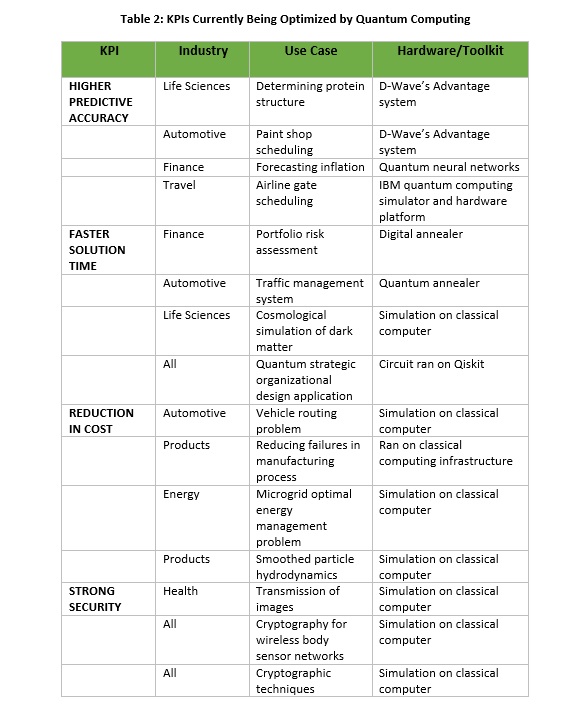Discussions around quantum computing present it as a revolutionary tech of tomorrow, when in fact, it is a technology that is here today.
As full-fledged quantum computers are still many years away, we explored quantum-inspired technologies—classical computers that harness quantum-like capabilities, a kind of simulated quantum computer. Our meta-analysis of papers from 2020 to 2022 identifies four business-relevant key performance indicators (KPIs) that quantum computing is optimizing today.
As noted in a previous IBJ Insight, “Are You Ready for the Quantum Leap?,” quantum computers are different from traditional ones because they can create boundless multidimensional spaces to represent real-world problems. And if projections prove accurate, this technology is on track to follow the path of artificial intelligence—which was once widely seen as pure science fiction, but now paints art that gives the Mona Lisa a run for her money.
Quantum computing could help our world tackle some of its most pressing problems. The potential benefits range from discovering the next transformative drug to combatting climate change, which is why the market—projected to grow from US$712 million last year to US$4.8 billion by 2029 (at a CAGR of 31.2 per cent, according to Fortune Business Insights)—has Google, IBM, Microsoft, and many others racing to develop quantum technology.
Conducting a meta-analysis of an industry’s literature has been previously fruitful for determining a collective census on topics in various fields. We applied the same research method to quantum computing, seeking to discover real-world applications of quantum currently being tested. Utilizing Google Scholar, we conducted an in-depth review of roughly sixty scholarly articles from 2020 to 2022, including scientific papers and editorials about quantum and interviews with the industry’s engineering pioneers. This research collected data on the industry (Accenture’s classification), business process (APQC’s framework), application areas, and KPIs. We also collected data on hardware and software being deployed along with vendor companies providing these tools.
Table 1 summarizes the distribution of papers used in our study across industries and their country of origin.

While our research showed there is a decent volume of activity coming out of Asia, North America seemed to lead the charge in terms of research activity, geographically. That said, we recognize our literature review was challenged by language barriers and limited access to Chinese databases. And since China’s research output in quantum technology is extremely high, closely following the United States, more research is required before making firm geographic conclusions.
In our literature review, we came across a wide variety of algorithms that are being used for different use cases. Classical algorithms, like backpropagation or optimization, are being performed on quantum hardware or toolkits. In addition, modified and quantum-inspired algorithms are run on classical hardware. The altered algorithms, like quantum-inspired evolutionary algorithm or hybrid quantum-classical variational algorithms, mirror the capabilities of quantum computing. A diverse selection of algorithms catered specifically to the use case in the study, like quantum teaching learning-based optimization algorithm or quantum-optimized traffic management algorithm.
As highlighted in Table 2 below, our research found quantum computing is currently optimizing KPIs over a wide variety of industries and use cases. Our findings show the emerging technology has already repeatedly demonstrated higher predictive accuracy, faster solution time, reduction in cost, and strong security.
Higher Predictive Accuracy
From developing investment portfolios to forecasting the weather, prediction is a key component of numerous application areas. It involves utilizing data of the past to look into the future.
Companies use prediction to make insight-driven decisions in high-stakes situations. At the same time, consumers use it to help choose which movie to watch next. The ability to improve the predictive accuracy of any use case offers value to a wide variety of industries. And even in quantum computing’s early stages, our research demonstrates the technology can do just that.
Menten AI is establishing the new generation of protein-based drugs and enzymes powered by quantum technologies. The California start-up develops computational methods used in drug discovery that leverage quantum computing. The company has gained plenty of attention, with investments from Uncork Capital, Social Impact Capital, Creative Destruction Lab, and others.
As Menten AI’s CEO and co-founder Hans Melo notes in a company case study,
Using hybrid quantum applications, we’re able to solve astronomical protein design problems. We’ve seen extremely encouraging results, with hybrid quantum procedures often finding better solutions than competing classical solvers for de novo protein design. This means we can create better proteins and ultimately enable new drug discoveries.
Using D-Wave’s Advantage quantum computer, Melo’s company was able to explore an enormous combinatorial space and determine the optimal composition and configuration of the branches of the peptide. The results show higher predictive accuracy when compared to classical methods. Menten AI’s work demonstrates the power and potential quantum computing holds in the life sciences industry.
Faster Solution Time
Time is a valuable resource across almost all facets of business, which is why best practices call for minimizing how much of it is used when completing tasks—whether you are delivering a product or processing payroll. And when it comes to time management, quantum computing offers a speed-up in several different use cases that can greatly increase efficiency while enabling results to be delivered consistently.
Volkswagen, for example, developed a quantum-optimized traffic management system to ensure public transportation takes the fastest route. Implemented in Lisbon and Barcelona, the system reduced the amount of time that taxis and buses must wait for passengers, as well as minimized long-distance routes without passengers.
As transportation is currently the largest contributor to US greenhouse gas emissions, the new technology presents a novel solution. The passengers and drivers benefit from taking the most efficient route, while the environmental impact of emissions on cities decreases.
Reduction in Cost
Amidst discussions of a looming recession, it is vital that businesses are aware of when and where they can cut costs. It is often a necessary part of business strategy, but it can often lead to negative outcomes for employees. Rather than announcing layoffs or reducing pay, quantum computing offers an alternative method to reduce expenses.
Indeed, early adoption of quantum computing showcases an opportunity to generate enormous savings in advanced manufacturing by targeting failures. In the manufacturing process, failures are rare but extremely costly. To determine the cause of failure requires solving a very large combinatorial problem, which quantum does very well.
Solid State AI has been experimenting with quantum-inspired algorithms that help manufacturers reduce the number of failures, as well as understand why they are occurring. The improved solution enables firms to cut costs without laying off employees or closing facilities.
Strong Security
Security enables organizational resilience via protection, detection, and response measures related to existing and evolving threats. As a result, it is a critical and ongoing task, and quantum is already showing progress in providing outstanding security in several use cases.
That said, when it comes to organizational and national security, it must be noted that quantum is a double-edged sword because it poses a serious threat to modern cryptography.
All modern cryptography, from passwords to current financial systems, can be hacked once we have a quantum computer that is powerful enough. Enterprises must be aware of the need for quantum-safe cryptography and prepare for this upcoming threat.
As the health-care industry shifts to storing and transferring data on cloud-based platforms, concerns around patient confidentiality increases. In a study, quantum offers a tamper-proof approach to support secure transmissions in E-health-care platforms. As highlighted in a white paper on the potential impact of a transition to the quantum computing paradigm, the proposed method demonstrates a veritable strategy for efficient medical image steganography, resulting in high resistance to data loss attacks and high embedding capacity.

Quantum computing isn’t yet ready to transform the world or provide a direct economic advantage. But as concrete evidence shows, the emerging technology already has clear use cases that can help today’s leaders compete in a fast-moving business environment that requires an innovation-led mindset to survive over the long haul.
As quantum-inspired methods are now demonstrating improvements in prediction and speed, a future with a large-scale quantum computer appears to be one with immense opportunities for breakthrough discoveries that address social and environmental challenges along with a dramatic increase in business use cases that will create new growth opportunities. In fact, most respondents (95 per cent) who contributed to Accenture’s 2023 Tech Vision report said quantum computing will likely be a major driver of industry breakthroughs over the next decade.
Companies actively preparing for the quantum revolution are poised to see huge advantages and reap immediate benefits down the road—when they stand a better chance of being a disruptor than companies currently dismissing this emerging technology as over-hyped.
In other words, the days of the “fast follower” look over.
References
- Francesco Bova, Avi Goldfarb, and Roger G. Melko, “Commercial Applications of Quantum Computing,” EPJ Quantum Technology, January 2021.
- Murray Thom, “Solving Problems with Quantum Annealing,” Digital Welt, February 2021.
- Hodan Omaar, “Why the United States Needs to Support Near-Term Quantum Computing Applications,” Centre for Data Innovation, April 2021.
- Yuqi Wang, Yue Chen, Zhiqi Wang, and Kai Song, “A Novel Metric for Assessing National Strength in Scientific Research: Understanding China’s Research Output in Quantum Technology through Collaboration,” Journal of Data and Information Science, October 2022.
- Mark W. Lipsey and David B. Wilson, “Practical Meta-Analysis,” Sage Publications Inc., August 2000.
- Jonathan Ruane, Prashant Shukla, Marc Carrel-Billiard, and Carl Dukatz, “Are You Ready for the Quantum Leap?,” Ivey Business Journal, September/October 2022.


